Accelerating the energy transition
Energy of the future, as well as a powerful lever for fighting climate change, electricity is accelerating the sustainable transformation of territories and energy uses. Faced with the challenge of the energy transition, Rexel shares a major responsibility with all of the electrical industry’s stakeholders. As a promoter of energy management services and solutions, Rexel places the energy transition at the heart of its value creation strategy, confirming both its ambition and its commitment to building a sustainable future.
IDENTIFYING THE PRIORITY ISSUES
The Rexel Group frequently conducts materiality analyses to identify the most significant environmental and social impacts of its activities. Led by key stakeholders, both internal and external (interviews with experts, customers, and suppliers), the 2019 analysis enabled the identification of around 40 issues across the value chain.
The materiality matrix stemming from these analyses highlighted 20 priority issues among the 34 that had been pre-identified.
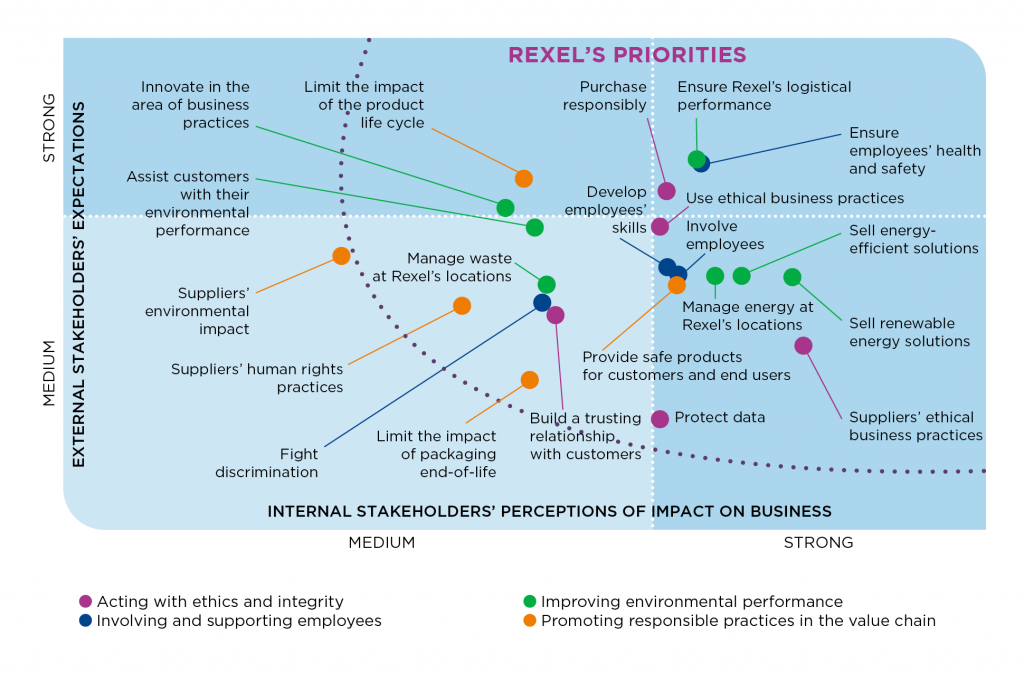
Learn more about Rexel’s Materiality Analysis Methodology.
The four pillars of the sustainable development strategy
The materiality analysis allowed Rexel to refine its sustainable development strategy and to specify its priorities. Today, this strategy is divided into four operational pillars.
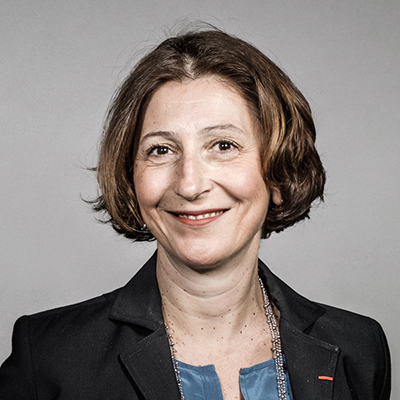
“All of Rexel’s actions in the area of sustainable development are based on these four pillars, which are vehicles for the Group’s growth, innovation, and performance.”
Nathalie Wright,
Chief Digital & Sustainability Officer Rexel Group
CONSTRUCTIVE RELATIONSHIPS WITH STAKEHOLDERS
Rexel takes into consideration the expectations of its stakeholders everywhere the Group operates, through dialogue that aims to be constructive, transparent, and based on mutual trust. For Rexel, these frequent exchanges play a key role in the successful exertion of its corporate responsibility. They help the Group to better identify the social, economic, and environmental issues and risks, thus enabling it to adapt to the latest societal challenges as effectively as possible.
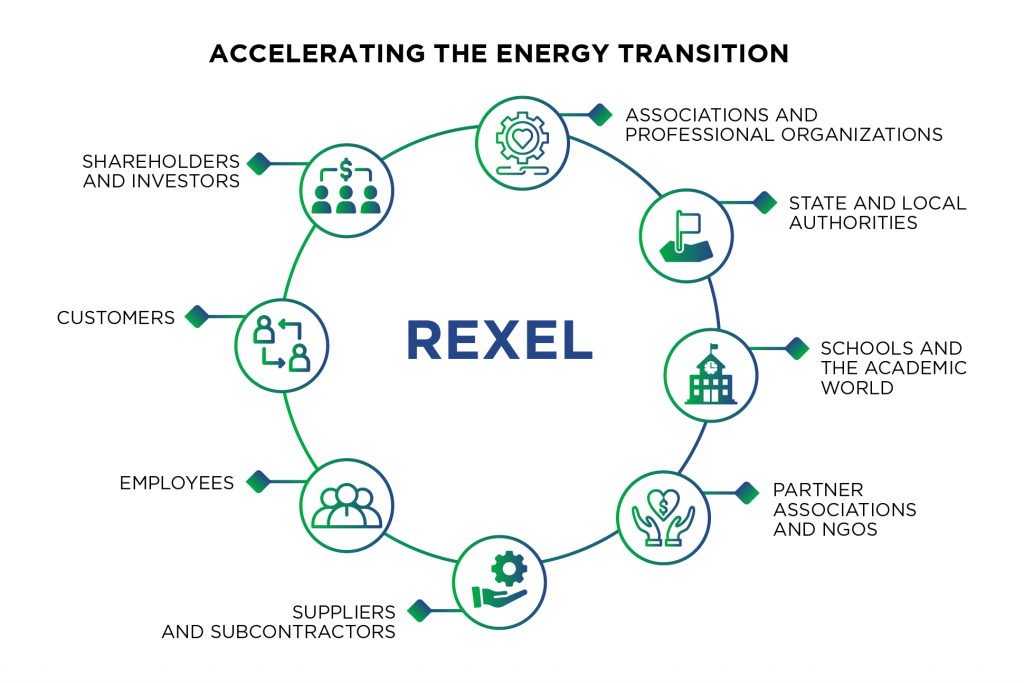
1. Shareholders and investors
Rexel communicates its financial results and sustainable development priorities and initiatives in full transparency with its shareholders and investors. These exchanges may be one-time or regular, depending on the audience concerned the and events in the Group’s activity.
2. Customers
A real partner, Rexel supports and accompanies its customers in their value creation and in the management of their activities. Its omnichannel model provides the conditions for a unique, close relationship. The Group provides numerous opportunities to meet and interact: Sales events, trade fairs, training programs, etc. Customer satisfaction surveys are frequently carried out. In 2022, 17 of 21 countries evaluated their customers’ satisfaction via a shared indicator, the Net Promoter Score.
3. Employees
Rexel strives to create a climate conducive to quality social relations through responsible and constructive dialogue with representative bodies.
Beyond this, being mindful of employees and their wellbeing is one of the Group’s chief priorities. Its corporate responsibility is reflected in the constant attention paid to every aspect of quality of work-life. In keeping with its continuous progress approach, Rexel conducts regular employee engagement studies.
4. Suppliers and subcontractors
Upstream of the value chain, Rexel develops long-term, equitable relationships with all of its suppliers and subcontractors, who embrace the shared requirement for active social and environmental responsibility.
The Group asks them to comply with the principles of its Responsible Supplier Charter and its Ethics Guide. They are contractually required to respect the clauses relating to general sales conditions, specifically those regarding the respect of the International Labour Organization’s fundamental conventions.
5. Associations and professional organizations
Rexel participates in the public debate regarding the strategic issues surrounding its business activity. As a member of various professional associations*, the Group contributes to the development of the profession’s practices and methods. In keeping with the driving forces of transparency and progress, the Group invests itself in various studies and specialized publications, especially those involving environmental issues. A signatory of the French Business Climate Pledge in 2015, Rexel reaffirms its commitment to the subject through the association Entreprises pour l’Environnement (Companies for the Environment). Finally, the Rexel Foundation for a better energy future contributes to improving access to energy efficiency for all and to fighting fuel poverty.
*Afep (French Association of Private Enterprises or Association française des entreprises privées in French), Perifem, the FDME (Federation of Distributors of Electrical Equipment or Fédération des distributeurs de matériel électrique in French), the EUEW (European Union of Electrical Wholesalers), ETIM International (European Technical Information Model).
6. State and local authorities
Thanks to its global presence based on local roots, Rexel is a key contributor to the development and economic activity of regions and countries by supporting their development and local employment.
As an international group, its commercial and financial activities are structured within the framework of current legal and fiscal obligations in the countries in which the Group operates, as well as the international treaties between these various countries.
7. Schools and academic players
The development and promotion of the fields of commerce and energy are at the heart of Rexel’s relationships with the educational and academic world. The Group is committed to the inclusion of young people, in particular through a proactive apprentice recruitment policy. The Rexel Foundation also supports scientific and academic research via the attribution of scholarships to students and researchers. The funded work focuses in particular on energy consumption patterns and behaviors.
8. Civil society
Civil society’s expectations in terms of positive impact on the local economy and support social progress are more and more pressing and Rexel must respond to them. This is part of the mission of the Rexel Foundation for a better energy future, which maintains a permanent dialogue with the nonprofit community and funds community projects in its countries of operation. The Foundation also helps promote innovative business models via a social entrepreneurship support platform.
OUR CONTRIBUTION TO THE SUSTAINABLE DEVELOPMENT INITIATIVES OF THE UNITED NATIONS
Our compliance with the UN Global Compact
Committed to the United Nations’ Global Compact since 2011, Rexel strives to apply its universal principles via concrete initiatives and to promote them among its partners. This commitment echoes the Group’s longstanding initiatives in support of the responsible practice of its trades, such as the development of an Ethics Guide resulting from a collective process of continuous progress.
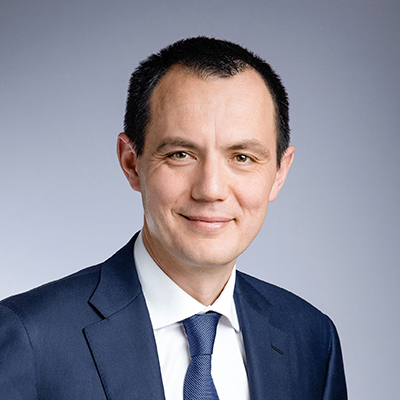
“The Rexel Group has been a member of the UN Global Compact since 2011. For us, it is a powerful and symbolic commitment to human rights and labor standards, protecting the environment, and fighting corruption. We will continue to strive to apply these universal principles through concrete initiatives and to promote them among our partners. It is a collective support and continuous improvement process, and we reaffirm our desire to contribute to it.”
Guillaume Texier,
Chief Executive Officer of Rexel
| Human rights | |
| Global Compact principles 1 – Support and respect the protection of internationally proclaimed human rights 2 – Make sure to not be complicit in human rights abuses |
Our commitments Ethics Guide Social responsibility clauses included in purchasing contracts Social responsibility policy Community Involvement Charter and The Rexel Foundation for a better energy future |
| International labor standards | |
| Global Compact principles 3 – Uphold the freedom of associations and the effective recognition of the right to collective bargaining 4 – Eliminate all forms of forced and compulsory labor 5 – Effectively abolish child labor 6 – Eliminate discrimination in respect of employment and occupation |
Our commitments Ethics Guide Social responsibility clauses included in purchasing contracts Social responsibility policy
|
| Environment | |
| Global Compact principles 7 – Support a precautionary approach to environmental challenges 8 – Undertake initiatives to promote greater environmental responsibility 9 – Encourage the development and diffusion of environmentally friendly technologies |
Our commitments Ethics Guide Social responsibility clauses included in purchasing contracts Environmental Policies Environmental Charter Community Involvement Charter and The Rexel Foundation for a better energy future |
| Anti-corruption | |
| Global Compact principles 10 – Work against corruption in all its forms, including extortion and bribery |
Our commitments Ethics Guide Anti-corruption and anti-money laundering policies |
Our contribution to sustainable development goals
In 2015, the member states of the United Nations adopted 17 Sustainable Development Goals (SDG), calling upon all economic players to help resolve sustainable development issues together. With support from its materiality analysis conducted with its stakeholders, Rexel has identified the most significant SDGs for its business. The Group has thus defined the associated action plans as well as the means necessary for their implementation.
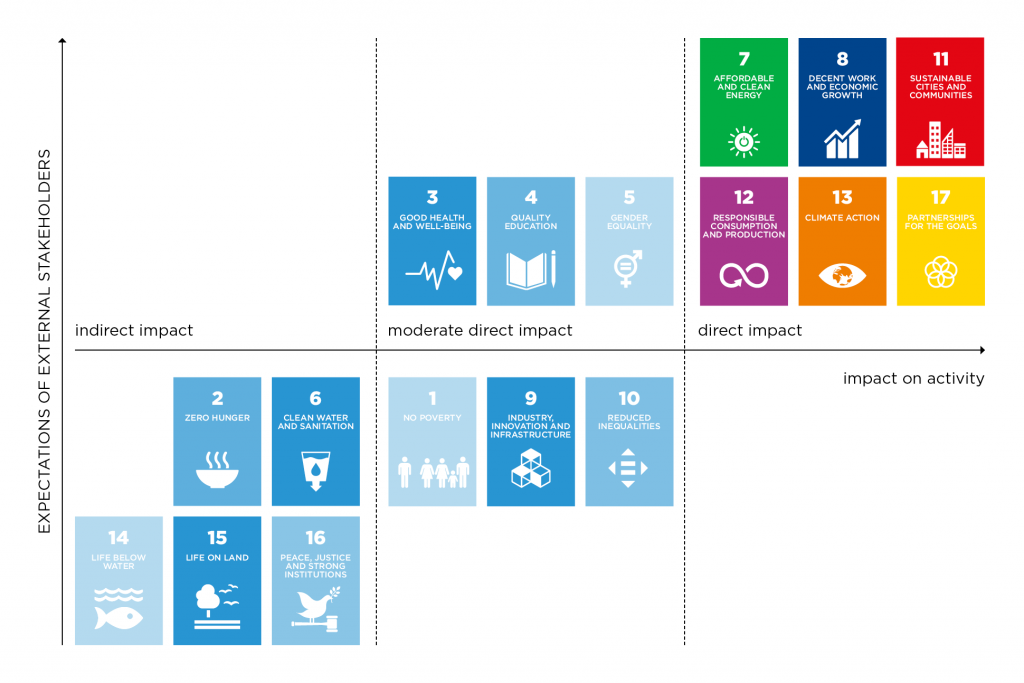
SDG 7: Guarantee access to reliable, sustainable, and modern energy services at an affordable price
• Offer energy-efficient and renewable energy solutions
• Fight fuel poverty via the Rexel Foundation for a better energy future
• Control the energy consumption of its buildings and transports
SDG 11: Ensure that cities and human establishments are open to all, safe, resilient, and sustainable
• Offer energy-efficient and renewable energy solutions
• Protect the personal data of stakeholders
• Provide safe solutions for installers and end-users
SDG 12: Establish sustainable modes of consumption and production
• Buy responsibly
• Guide customers toward sustainable practices
• Build relationships of trust with customers
SDG 13: Take urgent action to fight climate change and its repercussions
• Offer energy-efficient and renewable energy solutions
• Lower the greenhouse gas emissions of its operations
• Guide its customers toward low-carbon solutions
SDG 17: Build partnerships to meet sustainable development goals
- For each goal to be met, identify and include the stakeholders concerned
SOLID MANAGEMENT
Rexel’s environmental impact is distinguished more by its dispersal than by its magnitude, owing to the diversity and deployment of its activities in 2,000 locations and 21 countries. The success of the Group’s environmental policy effectively involves precise, robust management as close to the field as possible. Operated by the Sustainable Development Department, attached to the Group’s Transformation Department and in coordination with the functional departments of the headquarters and the local operational teams, the policy applies to all three levels of the environmental strategy: Common procedures and rules for all subsidiaries; close control of the implementation of these rules in all operations; and performance indicators to validate progress.
Management tools
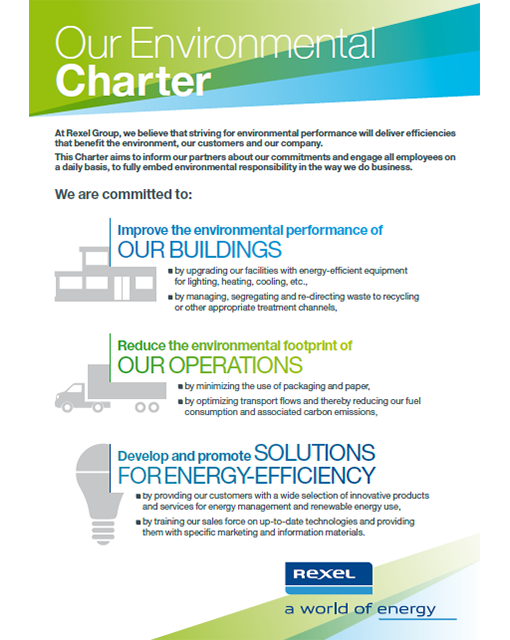
Environmental Charter
For the past several years, Rexel has relied on its Environmental Charter for the implementation of its environmental policy. Regularly updated to include societal changes, the charter is currently available in 12 languages and distributed in all the countries where the Group operates. Displayed in 90% of Rexel’s sites, it explains the Group’s environmental commitments and aims to mobilize its employees, who are key contributors to the success of its implementation. Rexel also encourages the deployment of Environmental Management Systems (EMS). Adopted in 45% of its countries, EMS define the organizational methods and procedures intended to control the environmental impact of its activities. Ten subsidiaries have also undertaken the process of ISO 14001 certification, which attests to their commitment to the continuous improvement of their environmental approach.
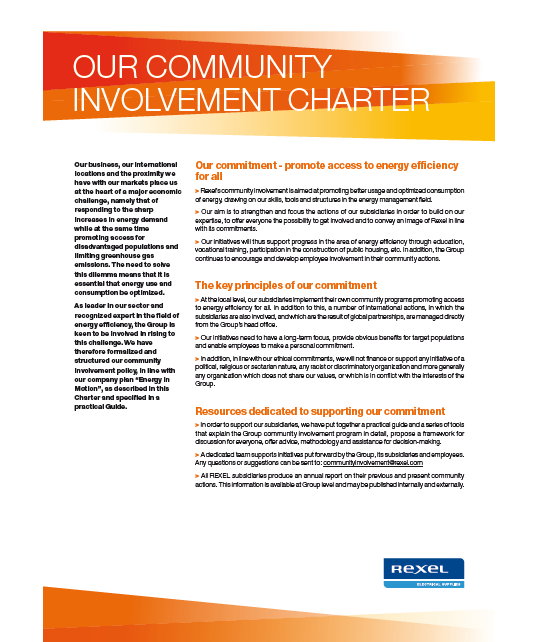
Community Involvement Charter
With this Community Involvement Charter, Rexel formally explains its mission as cultural leader of the electrical industry: Improve access to energy efficiency for all. It is a means for the Group to structure its approach and that of its subsidiaries based on a territory of unifying commitment.

Sustainable Supplier Charter
Written in 2020 and deployed in 2021 to the publics concerned, the Sustainable Supplier Charter strengthens the relationship of trust created between Rexel and its partners. While underscoring the Group’s commitments, it formalizes its expectations regarding its partners in various areas of responsibility: Ethics, human rights, protection of employee rights, respect for the environment, and compliance with applicable laws and regulations. From the perspective of its own commitments, Rexel interacts with its suppliers as early as possible in order to help them improve their sustainable performance. The Sustainable Supplier Charter completes and formalizes this support process.
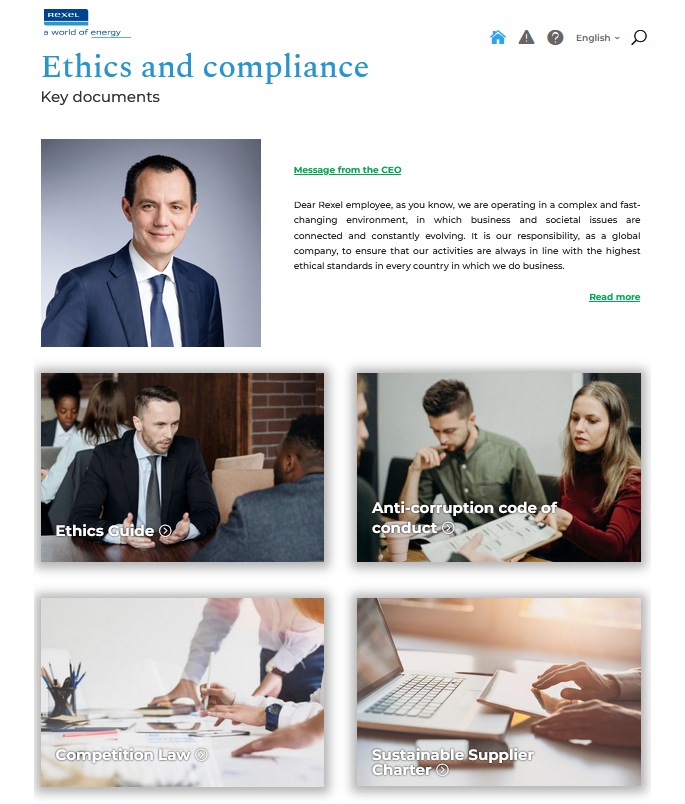
Ethics Guide
The fundamental expression of Rexel’s continuous improvement process, the Ethics Guide specifies the Group’s requirements in terms of ethics, transparency, and anti-corruption. It includes two central themes: Business ethics and employee-related topics. To facilitate its distribution internally as well as among its customers, suppliers, and all of its partners, the guide is available in all of the Group’s languages and in digital format. This key resource is regularly updated and is enhanced with documents that add detail to Rexel’s more specific commitments (Anti-Corruption Code of Conduct, Competition Law Guide, Responsible Supplier Charter)
Environmental, social, and ethics reporting
Environmental and social reporting represent a critical driver for Rexel’s Corporate Social Responsibility (CSR) policy. It has multiple goals: Provide content for the indicators of the Sustainable Development Department and the Human Resources Department to steer the implementation of the strategy, facilitate information sharing and the detection of best practices within the Group, and meet external reporting requirements. At the local level, it is run by a network of 75 environmental correspondents and 32 social correspondents.
Rexel’s environmental reporting reference document relies on recognized international standards. In addition to their operational responsibilities, the correspondents update a group of key indicators each quarter that make it possible both to monitor the environmental impact of all activities and to have a global view of the Group’s environmental footprint. The tool promotes continuous improvement in performance and interaction between subsidiaries. An annual external audit makes it possible to ensure the reliability of information published and to monitor the implementation of action plans.
In the social sphere, the network of ethics correspondents ensures a local link and responds to every question concerning the Group’s ethical practices. Everyone, whether employee or not, can contact them in complete confidentiality.

Awareness-raising initiatives
The involvement and mobilization of employees are essential to the success of Rexel’s sustainable development approach. The Group is committed to various awareness-raising initiatives, such as sustainable development training via the Rexel Academy. Ultimately, 100% of the Group’s employees will have undergone this awareness-raising program based on videos, practical cases, and quizzes.
A complete e-learning module on energy efficiency is also available to all, with three levels of expertise. Its goal? To help employees improve their skills and build confidence in the area of energy efficiency, at the center of many of their professional exchanges.






